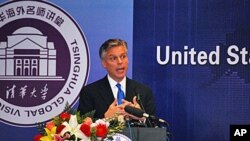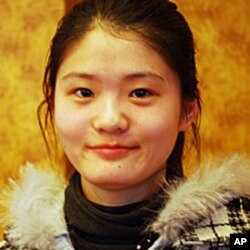The U.S. ambassador to China says the two countries should not let disagreements prevent them from working together on a range of global issues. But shortly after those comments, a Chinese official rejected international calls to allow the country's currency to appreciate.
In a speech at China's elite Tsinghua University Thursday, U.S. Ambassador Jon Huntsman stressed the importance of the United States and China working together.
Click to Listen:
Ambassador Huntsman said the Obama administration's first year in office focused on building a Sino-American relationship that is now being tested in its second year.
"To put our relationship on a more stable and mature footing, we have to de-link our differences on bilateral issues from our cooperation on global issues, including nonproliferation," he said.
One of the main issues of contention is a U.S. government sale of weapons to Taiwan, a separately governed island China regards as its territory. Another irritant is President Obama's meeting last month with Tibet's exiled spiritual leader, the Dalai Lama. China accuses the Dalai Lama of seeking independence for Tibet, which is a Chinese region.
One Tsinghua student asked Huntsman about another thorny issue, increasingly louder calls for China to allow its currency to rise in value.
"My Chinese friends like to picture this as just an American issue and I would like to say that there are many countries that feel the same way, many of China's largest trading partners feel that way,” said Huntsman. “I was with some yesterday. There are some in Europe, some in South America, but more than that the IMF, which is not a country, but has many country participants, has spoken out on this issue."
Many of China's trading partners say Beijing keeps its currency artificially low to give its exports an unfair trade advantage.
A bipartisan bill introduced Tuesday in the U.S. Senate aims to press Beijing to let its currency, the yuan, rise. And, a semi-annual U.S. Treasury report due in mid-April could trigger even greater pressure on Beijing by officially labeling China a currency manipulator.
At a regular Foreign Ministry briefing, spokesman Qin Gang countered the exchange rate is not the main cause of the U.S. trade deficit with China.
Qin says it is not fair to pressure China to appreciate its currency, and he accused the United States of engaging in trade protectionism at the same time.
Back at Tsinghua University, some of the students were impressed with Huntsman, but this 18-year-old student, who identified herself only as Ilena, said she found some of his comments "superficial."
ILENA: "I am satisfied to catch a glimpse of him. He is really handsome and charming, but I am not so satisfied with his speech."
HO: "What issues?"
ILENA: "Human rights."
In his speech, the ambassador was frank in expressing disappointment with China's human-rights record. But, in the question and answer session that followed, an Iranian student at Tsinghua received a smattering of applause when he accused the United States of criticizing other countries, while ignoring its own human-rights violations.
Ilena pointed to that exchange and said she would have preferred to see the U.S. ambassador touch on human rights more deeply, so that students from different countries could discuss the issue from their own points of view.





